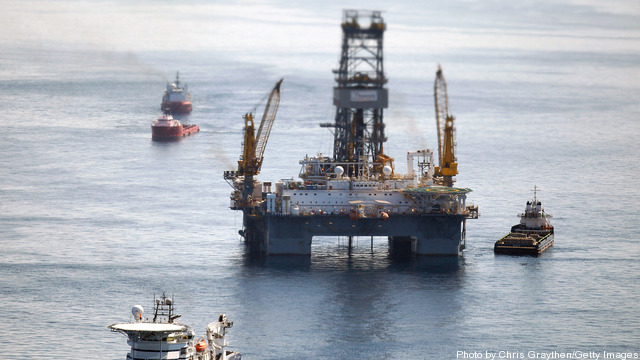A proxy battle between activist investor Carl Icahn and Transocean – the world’s largest offshore driller, and owner and operator of the ill-fated Deepwater Horizon rig that exploded and sank in the Gulf of Mexico in 2010 – comes to a head today at the company’s annual shareholders meeting.
The dispute comes down to control of the board, as well as dividend strategy – does Transocean create more shareholder value through larger dividend payouts, or by investing in long-term growth? Transocean’s board has recommended a dividend of $2.24/share. Icahn wants that dividend bumped up to $4.00/share. He also wants to replace three board members – Mike Talbert, Robert Sprague and Thomas Cason – with his own picks, Jose Alapont, John Lipinski and Samuel Merksamer.
This is not Icahn’s first foray into the oil and gas world. His push for management changes at Chesapeake Energy, long saddled with heavy debt levels and poor share price performance, succeeded in unseating multiple board members, as well as the company’s colorful former Chief Executive, Aubrey McClendon.
Icahn’s efforts to make changes at Transocean also appear to be bearing fruit. Transocean Chief Executive Mike Talbert announced his decision to step down from the board on May 13.
But shareholders have not yet had their say on the issue of either dividends or board members. Talbert has requested that shareholders re-elect him as board chairman so that he can “facilitate an orderly transition of leadership”. Icahn objected to Talbert’s proposal in an open letter to shareholders on May 13.
Icahn’s Claims
Icahn has accused Transocean’s board of mismanaging the company and failing to deliver value for shareholders.
“Material improvements in market conditions have not translated into returns for Transocean shareholders,” said Icahn. He noted that a rise in ultra-deepwater drillship daily rental rates to more than $600,000 per day from less than $200,000 per day in 2005 has failed to prompt a commensurate move in the company’s share price.
Transocean’s counterclaims
Transocean responded to Icahn’s proposals and critiques with a presentation asserting that Icahn’s demand for a $4/share dividend has more to do with a large payout for Icahn than with the best interests of shareholders, who will ultimately lose out from the company’s inability to make necessary long-term investments.
Transocean has also stressed the lack of energy sector experience among Icahn’s board member candidates. Reporting on the issue has focused on Icahn’s previous harsh public criticism of John Lipinski for his “dismal performance” at the helm of CVR Energy.
Transocean Stock
Comparison with six other offshore drillers’ share price performance from January 7, 2005 to March 26 of this year suggests that Transocean’s share price gains have lagged those of peer companies. Transocean shares appreciated by around 20% for the period, compared to Rowan’s 34%, Diamond Offshore’s 72%, Ensco’s 88%, and Noble’s 48%. Atwood Oceanics and Hercules were outliers. The former’s stock price appreciated by over 290%, while Hercules’ share price lost more than 65% of its value.
What is notable about Transocean’s share price is that it was tracking roughly in line with Atwood Oceanics’ until mid-2009, after which Transocean shares languished and fell, while Atwood’s stock price made large gains.
Investment bank analysts have expressed some concerns with Transocean’s first-quarter 2013 results, but overall, they do not seem to share Icahn’s level of alarm at the company’s performance.
“Transocean remains one of our favorite offshore drillers and continues to execute on a series of strategic priorities, including operational improvements and fleet enhancement,” said Barclays analyst James West in a report on May 9. “The company is also in the early stages of a significant cost cutting program, which should help move the company’s margins closer to peers.”
“We view the support of RIG’s [Transocean’s] proposed $2.24/sh dividend by the major proxy advisors as a positive, and a prudent level of distribution,” said Deutsche Bank analysts in a 12 May report. “If Carl Icahn is successful in extracting a $4/share dividend from Transocean – an upside risk – we believe this would leave RIG significantly disadvantaged in terms of its ability to re-capitalize its fleet and/ or participate in M&A.”
Neither Transocean nor Icahn responded to Breaking Energy requests for comment.
UPDATE: Transocean shareholders approved the board’s $2.24/share dividend, but did not re-elect Mike Talbert. Only one of Icahn’s board nominees – Samuel Merksamer – was elected to the board. Robert Sprague and Thomas Cason were re-elected.

